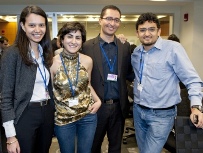
Youth group visits IMF headquarters. Engagement with civil society organizations at country level is central part of IMF’s public outreach (IMF photo)
The IMF and Civil Society
IMF Invites Public Input on Its Engagement with Civil Society
June 14, 2013
As part of its efforts to strengthen public outreach, the IMF has sought the services of an independent consultant to revise its Guide for Staff Relations with Civil Society Organizations (CSOs).
The near-term outlook for the region is broadly positive because most factors lending support to economic activity in the last few years remain in place—namely strong investment, favorable commodity prices, and generally prudent macroeconomic management.
To ensure broad input from civil society actors, an Online consultation on the guide will be open until August 2, 2013.
“As we work together to move past the global economic crisis, the IMF must continue listening to different voices, different perspectives,” said IMF Deputy Managing Director Nemat Shafik. “Our engagement with civil society organizations plays a pivotal role in this regard, and we want to listen to all ideas on how this engagement can be strengthened.”
IMF engagement with civil society
Over the years, the IMF has become more transparent and has sought to become more accountable, not only to its membership but also to the broader public. This has led to a more active involvement with CSOs, as well as legislatures.
When the IMF began to engage with CSOs in the 1980s, it was usually at a global level, in response to advocacy by groups concerned with economic and social justice. Engagement at the country level, especially in low-income countries, and at the global level remains central in IMF-CSO relations.
The IMF is currently stepping up its efforts to engage more systematically with southern CSOs.
The aim of the guide—first prepared in 2003—is to support IMF staff in building positive relationships with CSOs. It offers a framework of good practices and is not intended to supplement—or replace—sound judgment and experience.
Scope of the project
The Fund hired independent consultant Bessma Momani, Associate Professor at the University of Waterloo, to revise the guide.
In addition to the online public consultation, Momani is seeking input from CSOs through a In addition to the online public consultation, Momani is seeking input from CSOs through a survey and numerous interviews, including with southern CSOs. She also held a session on the guide’s revamp during the IMF–World Bank Spring Meetings’ CSO Policy Forum in April 2013.
As part of the project, Momani is assessing how the guide can be improved, reviewing similar guides prepared by comparable institutions and identifying best practices. She will also provide the IMF with recommendations on how to conduct Public consultations on policy issues early on in the process.
“We hope CSOs use this opportunity to tell us how they envisage our engagement with them, so that this engagement can enhance the Fund’s operational work and assist us at better meeting the needs of our membership,” said Sabina Bhatia, Chief of Public Affairs at the IMF. “The new guide should also reflect changing circumstances; CSOs, the IMF, the world—all have evolved in the past decade.”
Upon completion of the consultation and review of survey results, Momani will prepare a draft of the new guide and present it to members of civil society at the 2013 IMF–World Bank Annual Meetings in October in Washington D.C. The IMF plans to submit the final version of the new guide to its Executive Board for information in late 2013 and will publish it soon thereafter.
What is ‘civil society’?
For IMF purposes, civil society is composed of voluntary associations of citizens seeking to shape governance structures and policies.
Civil society actors, therefore, include business forums, faith-based associations, labor movements, local community groups, nongovernmental organizations, philanthropic foundations, and think tanks, among others.
Usually excluded are the branches of government (government agencies and legislators) as well as individual businesses, political parties, and the media.








